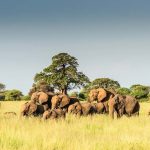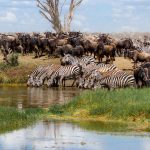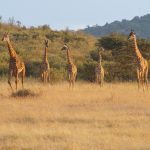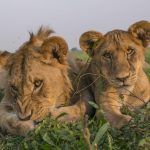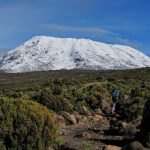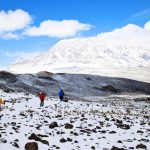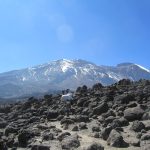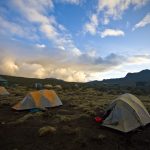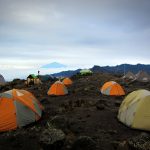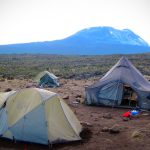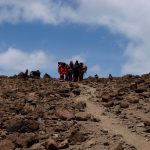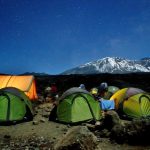FAQ
Booking & Payment
To make sure you get a spot, you should make your reservation as early as possible. This is especially important for travelers who book private safaris or extend their trips. However, we always accept last-minute reservations. Get in touch with us for more details.
We accept Visa and MasterCard for your safari deposit. The remaining balance is due 90 days prior to departure and is payable by check, wire transfer, or money order.
All lodging, meals, bottled water with meals, wildlife viewing drives, airport transfers, park entrance fees, and the services of guides and drivers are all included in your safari land packages.
We accept Visa and MasterCard for your safari deposit. The remaining balance is due 90 days prior to departure and is payable by check, wire transfer, or money order.
Additional costs not provided may include:
- airfare,
- tips for your guides/drivers/staff,
- bar beverages,
- laundry service,
- phone calls,
- passport and visa fees,
- souvenirs,
- donations to local charities and travel insurance.
Please note: Your pre-departure packet includes a visa application form and information on travel insurance and tipping.
Health & Safety
Yes! Tanzania is one of the most stable nations in Africa. The welcoming locals will make you feel at home, and the caring staff will look after you at all times. Rest up at carefully chosen camps and lodges that offer both traditional African charm and contemporary comforts after long days spent viewing wildlife.
While visiting Tanzania, you should refrain from drinking any tap water, not even for tooth brushing. Free bottled water is available at all of our camps and on all of our wildlife viewing drives. Additionally, all lodges sell bottled water.
Depending on the season, it changes. It is advised that you bring citronella-based products and deet-based repellents in case you come across mosquitoes, tsetse flies, or other small insects. Avoid wearing dark blue or black while on safari because tsetse flies are drawn to those hues.
The CDC travel website is a good place to look up the most recent vaccinations required by country. Certain nations, but not the United States, must have yellow fever vaccination before entering Tanzania. The annual flu shot and all other routine vaccinations are advised. It is advised to take medication for malaria, typhoid, and hepatitis A. Please make sure to speak with your doctor at least six months before your trip to ensure you have enough time to get any missed vaccinations. Remember that you will be staying in camps and lodges intended for Americans and European visitors. Our guides will give you recommendations on what to try and avoid if you go to a local market or restaurant while on your tour.
Clothes, Food & Weather
Don something cozy and casual that you don’t mind getting dirty. In case you need to hand wash some items, we advise dressing in layers and quick-drying materials. Avoid wearing white, dark blue, and black while on a game drive (white can scare away animals, and dark blue and black attract Tsetse flies). After you’ve made your safari reservation, we’ll mail you a thorough packing list to assist you.
The high caliber and selection of the food on our safaris will pleasantly surprise you. Meals are typically served buffet-style in the majority of lodges and tent camps, with a wide variety of fresh meat, vegetable, and fruit options. Frequently, the cuisine is made with western tastes in mind (some local dishes are included).
Meals that are vegetarian, vegan, gluten-free, and suitable for diabetics can be easily arranged with advance notice. As soon as you book your trip, be sure to let us know.
Tanzania’s climate is typically sunny, dry, and warm, though there are variations. December through March is warmer (70ºF – 80ºF) with a higher chance of occasional rain. May through November is cooler and drier (60ºF – 80ºF). April usually brings more rain so we do not operate scheduled trips during that time.
Wildlife & Safari
Tanzania’s north One of the highest concentrations of wildlife in the world can be found in the Ngorongoro Crater, a World Heritage Site. Numerous animals can be found throughout the vast plains of Serengeti National Park, particularly during the wildebeest migration. Selous Game Reserve and Ruaha National Park both have abundant wildlife and few visitors in southern Tanzania.
All kinds! You will see the animals you’ve always dreamed of encountering on safari—lion, cheetah, leopard, zebra, elephant, hippo, giraffe, gazelle, warthog, wildebeest, and so much more.
We modify our itineraries, departure dates, and lodgings in accordance with wildlife migration patterns because Tanzania offers the best year-round wildlife viewing. Any time is a great time to go on safari in Tanzania. There are seasonal variations, of course, but there are always a lot of animals to be seen.
Huge herds of mammals, primarily wildebeest, gazelle, and zebra, move through the Serengeti all year long in search of food, water, and breeding grounds, a phenomenon known as the Great Migration. Rain is what propels the migration, making it challenging to forecast.

